The Art of the Walk? Summit collapse and Trump’s diplomacy
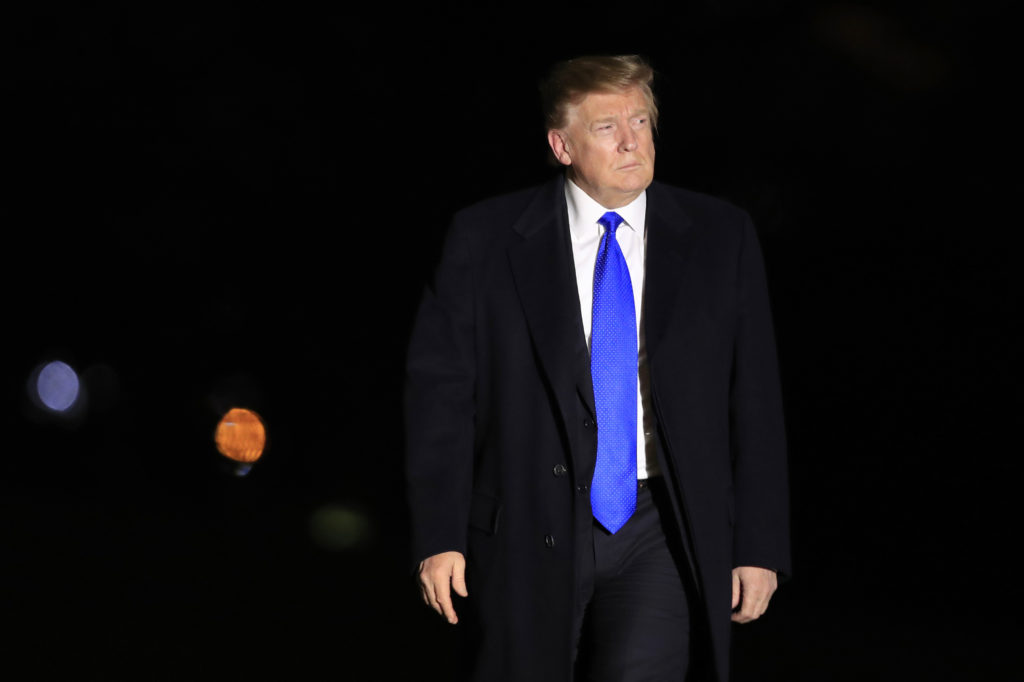
President Donald Trump framed the breakdown of his nuclear summit with North Korea’s Kim Jong Un as wisely knowing when “to walk.” But the stunning collapse revealed the limits of his unique brand of personal diplomacy and raised concerns about future efforts to disarm a global threat. Eyeing the history books and a much-needed political victory, Trump bet big on the two-day Vietnam summit only to be forced to explain away its sudden failure. The president and North Korea gave conflicting explanations of what went wrong, though the result actually was a relief to some critics and even some Trump supporters who feared he might give too much away in pursuit of a deal. Trump, the businessman who was elected in part on his boasts of deal-making prowess, said a proposed agreement was “ready to be signed.” But he said he refused to accept what he described as North Korean insistence that all U.S. sanctions be lifted without the North committing to eliminate its nuclear arsenal. “I’d much rather do it right than do it fast,” the president said. “We’re in position to do something very special.” The North said it had demanded only partial relief from the punishing sanctions. Trump had pushed for the summit, telling wary aides that his personal chemistry with North Korea’s young and reclusive leader outweighed any need for detailed, staff-level talks to iron out differences before either head of state set foot in Hanoi. Secretary of State Mike Pompeo, who along with his special envoy for North Korea, Stephen Biegun, had been leading the preparatory effort, said staff work had achieved some results but that negotiators had intentionally left some of the most contentious issues unresolved. “We were hoping we could take another big swing when the two leaders got together,” he told reporters as he flew from Vietnam to the Philippines after the summit collapsed. “We did. We made some progress. But we didn’t get as far as we would have hoped we would have gotten.” Pompeo noted that “when you are dealing with a country that is of the nature of North Korea, it is often the case that only the most senior leaders have the capacity to make those important decisions.” Echoing the refrain that “no deal is better than a bad deal” — often used during the Obama administration by critics of its Iran negotiations — there was relief in some quarters that the president had not impulsively agreed to concessions without much in return. “Kudos to him for walking away from the table,” said Jonathan Schanzer of the Foundation for Defense of Democracies, a Washington think-tank that has been highly skeptical of Trump’s efforts with Kim Jong Un. “No deal is, in fact, better than a bad deal.” And White House aides stressed that Trump stood strong. Some observers evoked the 1987 Reykjavík summit between Ronald Reagan and the Soviet Union’s Mikhail Gorbachev, a meeting that ended without a nuclear weapons deal but laid the groundwork for a future agreement. Long-standing U.S. policy insists that American sanctions on North Korea will not be lifted until that country commits to, if not concludes, a complete, verifiable and irreversible end to its nuclear weapons program. Trump, who did not consult with allies South Korea and Japan before breaking off the talks, declined to restate that goal Thursday, saying he wanted to retain flexibility with Kim. But North Korea’s foreign minister, in a rare news conference, said that Trump wasted an opportunity that “may not come again” and that the North’s position wouldn’t change even if there was another round of dialogue. The failure in Hanoi laid bare a risk in Trump’s negotiating style: Preferring one-on-one meetings with his foreign counterparts, his administration doesn’t always do the staff-level advance work intended to make a summit more of a victory lap than a negotiation. “The developments over the past 48 hours highlight in stark fashion the inherent weaknesses of President Trump’s preference for summit diplomacy — international media spectacles that have failed to achieve substantial progress on the key issues, especially denuclearization,” said Paul Haenle, the director of the Carnegie-Tsinghua Center for Global Policy. Unsurprisingly, former Obama administration officials agreed. “At every step of the way, Trump has placed himself, rather than professionals, at the center of this process — and as a result, he’s been outmaneuvered every step of the way,” the National Security Action, a group of mainly Obama-era foreign policy practitioners, said in a statement. Michael Fuchs, who worked on Asian issues as a State Department official under Obama, said there should be no more summits until the two sides are ready to announce a concrete agreement. “Let the real negotiators from both sides get to work,” he said. “Until then, no more reality TV summitry.” One beneficiary of the Vietnam summit may have been the North Korean leader. The first Trump-Kim meeting in Singapore gave the reclusive nation’s leader an entry to the international stage. The second appeared to grant him the legitimacy his family has long desired. Kim, for the first time, affably parried with the international press without having to account for his government’s long history of oppression. He secured Trump’s support for the opening of a liaison office in Pyongyang, without offering any concessions of his own. Trump’s backing for that step toward normalization provided the sort of recognition the international community has long denied Kim’s government. Experts worried that the darker side of Kim’s leadership, was being brushed aside. That includes massive human rights abuses, prison camps filled with dissidents, an absence of religious and speech freedoms and the executions of government and military officials. Trump also appeared to accept the North Korean leader’s assertion that he had nothing to do with the 2017 death of Otto Warmbier, an American college student who was imprisoned for allegedly taking a propaganda poster while on a visit to the country. The president said he took Kim “at his word” that he was unaware of the mistreatment
Donald Trump sees mixing trade, foreign policy as good politics
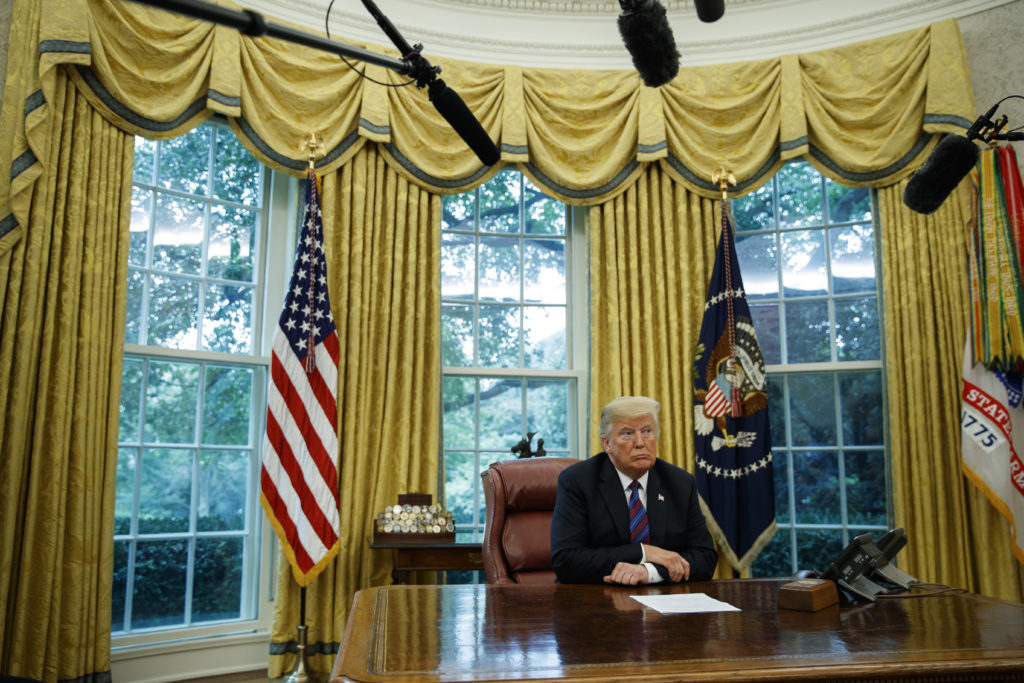
When President Donald Trump pulled the plug on an upcoming trip to North Korea by his secretary of state, he pointed a finger of blame at China and the global superpower’s trade practices. In his recent trade breakthrough with Mexico, Trump praised the country’s outgoing president for his help on border security and agriculture. Both developments offered fresh evidence of how Trump has made trade policy the connective tissue that ties together different elements of his “America First” foreign policy and syncs up them with his political strategy for the 2020 presidential election. Trump’s 2016 triumph was paved in part by his support among blue-collar voters in Midwestern manufacturing states that narrowly supported him over Democrat Hillary Clinton, including Michigan, Wisconsin, Ohio and Pennsylvania. His aggressive trade tactics, epitomized by tariffs and standoffs with longtime economic partners and allies, are aimed at reversing what he has long viewed as unfair trade deals while maintaining support among largely white, working-class voters who have been hurt by the loss of manufacturing jobs. “Trump understands that economic policy is foreign policy and vice versa,” said Stephen Moore, a former Trump campaign adviser and visiting fellow at The Heritage Foundation. “The most important element of foreign policy is to not just keep the world safe but to also promote America’s economic interest. That’s what Trump does — this is America First.” It’s also good politics, in Trump’s view. “It’s a populist position. But it’s also a popular position with a lot of Americans,” Moore said. As he puts a high premium on trade gains, Trump is intertwining the issue with a host of top foreign policy concerns. Trump, asked by reporters last week about North Korea living up to its commitments to denuclearize, said “part of the North Korean problem is caused by our trade disputes with China,” pointing to the U.S. trade imbalance with China. “We have to straighten out our trade relationship because too much money is being lost by us,” Trump said. “And as you know, China is the route to North Korea.” Trade has been a common refrain at the president’s rallies, where he has vowed to pursue “fair and reciprocal trade.” “We don’t want stupid trade like we had for so long,” Trump said during a rally in Duluth, Minnesota, in June. Trump’s second year as president has been marked by a number of trade disputes with traditional U.S. allies and global rivals alike, an approach cemented by his tweet that “trade wars are good.” He imposed tariffs on steel and aluminum imports in March, prompting retaliation from the European Union and other American allies. Later in the month, Trump announced tariffs on China to combat what he called the theft of U.S. technology from a wide range of goods and services. China struck back with its own sanctions on a variety of U.S. products, including Midwest farm-produced soybeans in a way to hit hard against the president’s base of voters. The two sides have clashed during the spring and summer, raising the stakes in their trade fight. In late July, Trump and European Commission President Jean-Claude Juncker reached a temporary deal at the White House to avert tariffs on automobile imports and a ramping up of their trade dispute — although the threat still remains. After a breakthrough with Mexico, Trump’s team has been engaged in talks with Canada aimed at creating a new version of the 24-year-old North American Free Trade Agreement. While previous administrations have often used a carrot-and-stick approach to trade as a way to forge agreements, before Trump’s arrival trade agendas had emphasized multi-lateral and bilateral deals aimed at maintaining U.S. leadership around the world, promoting American values and improving human rights. This administration, by contrast, “is leveraging foreign policy tools to achieve its trade goals,” said Lori Wallach, director of Public Citizen’s Global Trade Watch. Critics say Trump’s insistence on trade concessions could hamper his ability to move forward in other areas. On North Korea, for example, Trump has sought to turn his meeting with Kim Jong Un into a vivid example of how his unconventional style can bring longstanding U.S. adversaries to the bargaining table. But by raising China’s trade practices as essential to any progress to ensuring North Korea gets rid of its nuclear weapons, Trump runs the risk of getting bogged down in both areas — and having little to show for it. Mixing foreign policy and trade policy introduces so many variables it’s “virtually impossible to close on a precise policy decision,” said Daniel Ujczo, a trade attorney with Dickinson Wright PLLC in Columbus, Ohio. “You’re constantly chasing after the next issue as opposed to having a very targeted approach to the objective.” Republished with permission from the Associated Press.
Will Davis: It’s time to end the Diversity Visa Lottery program
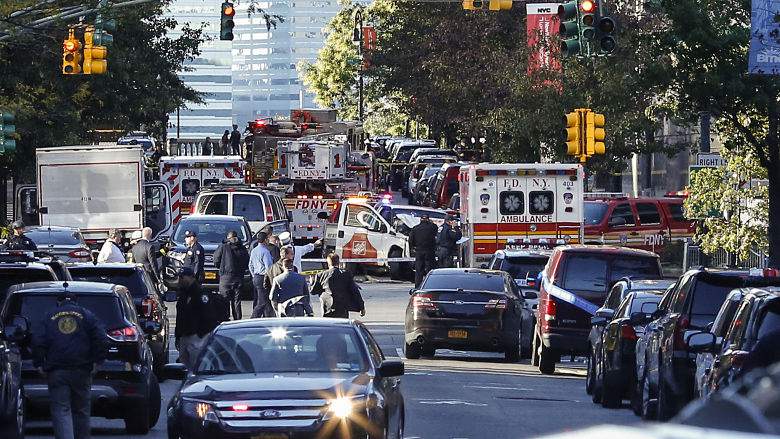
Following the terrorist attack in New York City on Halloween, by a radical Muslim that killed eight people, President Donald Trump has been leading the charge to eliminate what is known as a “Diversity Immigrant Visa,” that awards a green card to the winner of a lottery program that seeks to bring in people from “diverse” parts of the world that don’t usually send immigrants to the United States. One recent winner of this award was Sayfullo Saipov, a Uzbekistan national who was one of the lottery winners to obtain a green card in 2010. On Halloween, he murdered eight Americans, and severely injured eleven more. When Saipov awoke in his hospital bed, he showed no remorse, instead requesting an ISIS flag fly over his room. Aside from the fact the Diversity Visa program is unfair to more qualified immigrants who are currently waiting in line for an opportunity to come to the United States, this program has also become a grave national security issue. ISIS has already promised to infiltrate this program to send their soldiers to our shores, and while the investigation of Tuesday’s tragic shooting has not concluded, it appears that they already have and certainly have plans to do so again. Following the attack, Trump tweeted out his first call for the programs termination, tweeting, “The terrorist came into our country through what is called the ‘Diversity Visa Lottery Program,’ a Chuck Schumer beauty. I want merit based.” The terrorist came into our country through what is called the “Diversity Visa Lottery Program,” a Chuck Schumer beauty. I want merit based. — Donald J. Trump (@realDonaldTrump) November 1, 2017 While one can question the optics of Trump’s tweet so soon after the tragedy, the substance of what the president is saying remains. A program that was created by a bill sponsored by the senior senator from the state of New York, Sen. Chuck Schumer, allowed for the deaths eight New Yorkers on Tuesday. There have been bipartisan calls to eliminate the program in the past, and those calls should escalate after Tuesday’s tragedy. This is purely a national security issue. It is far past time for our foreign policy establishment to recognize the correlation between high scale immigration from war-torn, Islamic countries, and terrorism. ••• William Davis is a sophomore at the University of Alabama. There he is involved in various conservative groups and organizations.
Donald Trump advisers at odds over president’s foreign policy
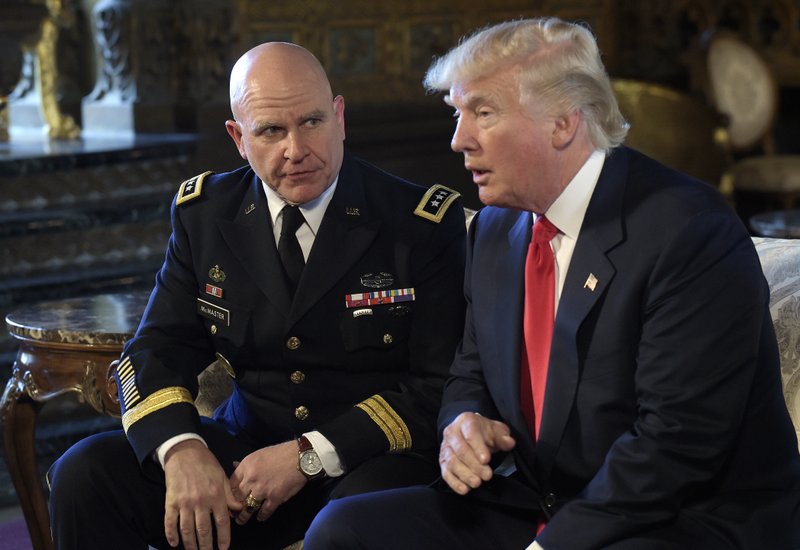
The direction of President Donald Trump‘s foreign policy is at the center of a battle between two of his top aides. Conservative groups are targeting national security adviser H.R. McMaster. They argue that he’s insufficiently supportive of Israel and not tough enough on Iran. Those critics along with a website tied to Trump adviser Steve Bannon are pushing for McMaster to be ousted. McMaster is one of several powerful generals in Trump’s orbit who hail from the Republican foreign policy establishment. But Trump is equally sympathetic to the views of firebrands like Bannon, who are trying to push the party in a new, isolationist direction embodied by his “America First” doctrine. Administration officials and outside advisers tell The Associated Pres that McMaster and Bannon have clashed over Afghanistan war strategy. Republished with permission of The Associated Press.
Donald Trump takes a more cautious approach on big trip
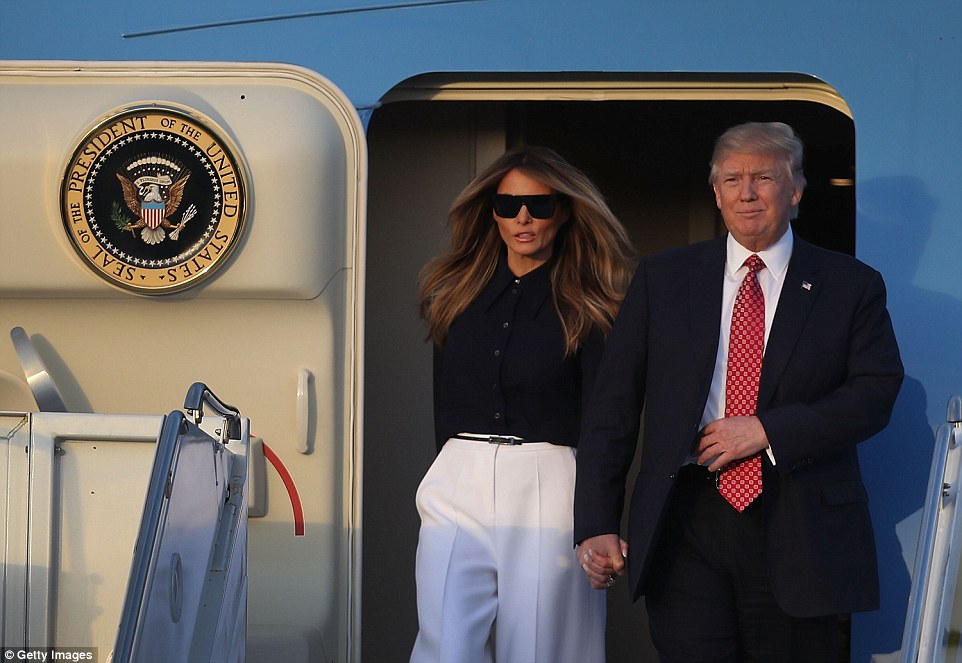
In his first big tour on the world stage, President Donald Trump is choosing caution over his usual brand of chaos. The early morning Twitter rants that so often rattle Washington have disappeared as Trump travels through the Middle East and Europe. The president has traded his free-wheeling speaking style for tightly scripted remarks. And with most of the traveling press corps being kept at a distance, the opportunities for him to be pressed on the controversies engulfing his administration back home are dramatically lessened. Trump did briefly respond to one shouted question about his meeting with Pope Francis on Wednesday, offering this indisputable assessment of the pontiff: “He is something.” The president appears likely to go his entire nine-day trip without holding a full news conference, a break from presidential foreign travel precedent. That’s allowed him to steer clear of the steady stream of new revelations about his dealings with ousted FBI Director James Comey and the federal investigations into his election campaign’s possible ties to Russia. And it’s left no real opportunities to push the president beyond his talking points on some of the trip’s most complex issues, including the prospect of restarting Middle East peace talks and strengthening regional alliances to combat terrorism. The White House has been jubilant over the trip’s results so far, and content to let the images of Trump meeting with world leaders tell the story instead of the president’s own unpredictable words. The White House did not respond to questions Wednesday about whether he might squeeze in a news conference on the final legs of the trip, his meetings with NATO and European leaders in Brussels and the Group of 7 summit in Sicily. Jen Psaki, who served as White House communications director for President Barack Obama, said every White House has to contend with the risks of letting events at home step on a trip’s message. But she said there’s also value in an American president engaging with the press on foreign soil. “We always saw press conferences as part of our objective: to send the message in countries without a free press, or with limitations on freedom of speech that the United States valued these sometimes-unpredictable interactions as a part of democracy,” Psaki said. Not that Trump has gone silent on his five-stop trip abroad. He called on Arab and Muslim leaders to step up in the fight against terrorism during an address in Saudi Arabia, and he called on Israelis and Palestinians to get back to the negotiating table during remarks Tuesday in Jerusalem. In both instances, he hewed closely to his prepared text – a rarity given his normal pattern of veering not only off script but sometimes wildly off topic. There have been some self-inflicted wounds, most notably Trump’s decision to field a journalist’s question to Israeli Prime Minister Benjamin Netanyahu about concerns over the president’s decision to share with Russia some classified intelligence that had been obtained by Israel. The president declared that he “never mentioned the word or the name Israel” in his discussions with the Russian officials. In one short set of off-the-cuff remarks in Jerusalem, Trump told an Israeli delegation that he had just gotten back from the Middle East – despite the fact that Israel is squarely in the region. Ron Dermer, the Israeli ambassador to the U.S., can be seen in the video visibly reacting to the flub. But some leaders Trump was slated to meet with on his trip had been preparing for far worse than the occasional Trump gaffe. At NATO headquarters, where he will visit Thursday, aides have prepped Secretary-General Jens Stoltenberg for the possibility that the president could try to pull off a stunt such as passing around invoices to member countries who have not met the alliance’s financial guidelines, according to a person with knowledge of the planning. Trump has been a sharp critic of NATO countries that don’t spend the agreed-upon 2 percent of their gross domestic product on defense, and Secretary of State Rex Tillerson said the president indeed planned to push allies hard on that issue. The person with knowledge of the NATO planning insisted on anonymity in order to disclose private discussions. Trump advisers vigorously contest the idea that the president’s more measured tenor abroad is the result of significant staff intervention, arguing that the president himself is behind the approach for his first foreign trip. The final leg may be the most challenging. After warm embraces from the leaders of Saudi Arabia and Israel, Trump will be meeting with European leaders who are still skeptical of his untraditional approach to politics and his hard-to-pin-down policy positions. The arrangements for the summits will also put Trump’s patience to the test, requiring him to spend hours locked in rooms listening to his foreign counterparts. Republished with permission of The Associated Press.
Martha Roby: Priorities abroad
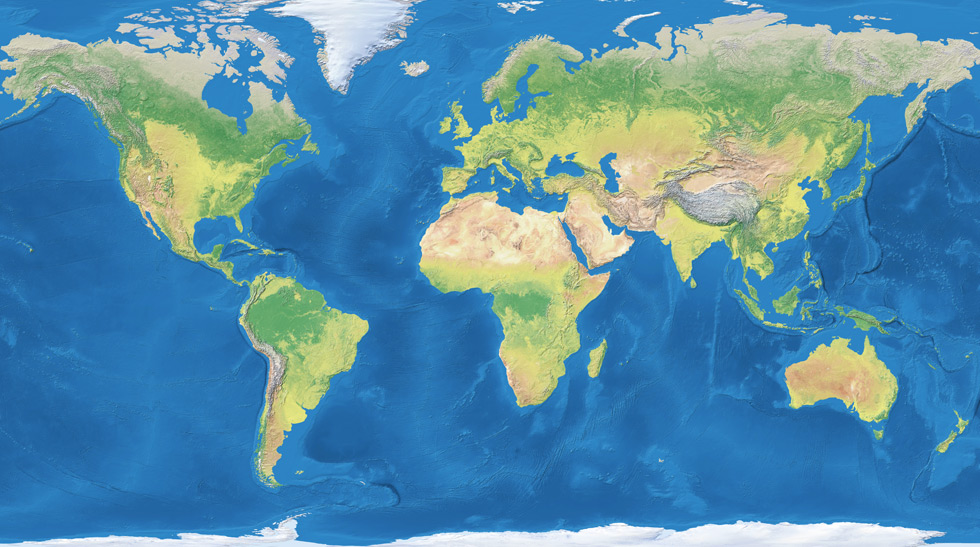
It has been more than fifteen years since American and allied forces invaded Afghanistan to topple the Taliban regime and stamp out the terrorist breeding ground it harbored. Many brave Americans have given their lives in the struggle to defeat al-Qaeda, and it is incumbent on us as a nation to honor their sacrifice by never allowing it to be in vain. Our Armed Forces remain engaged at this critical front of the Global War on Terrorism, which is why I recently led a Congressional Delegation to the region conducting oversight to better inform our efforts to fund and support the military. I’ve said for years that the “canary in the coal mine” for our success in Afghanistan going forward will be the preservation of the gains by women and girls to attain human rights. During our visit, our delegation met with Afghan First Lady Rula Ghani and many other women leaders. We discussed the opportunities now available to Afghan women that weren’t conceivable fifteen years ago under the Taliban. Most importantly, they explained just how critical these human rights are to the overall stability of Afghanistan. While it is certainly encouraging to listen to these remarkable stories of hope, there exists a deep concern about seeing our progress backslide. In fact, this is already happening in some areas of the country. The Taliban’s resurgence amid the drawdown of coalition forces presents a major threat that we must acknowledge. I believe the United States and our coalition partners cannot allow the gains we’ve made in Afghanistan to fall by the wayside. We know all too well what can happen when radical, oppressive ideologies are allowed to fester in hostile nations. Having observed the situation in Afghanistan over several years now, I can tell you that the progress today is as fragile as ever. That’s why I am pleased that President Donald Trump is reviewing our strategy in Afghanistan, including a reevaluation of troop levels and our rules of engagement. Simply put, if we’re going to be in Afghanistan, we need to be willing to do what it takes to succeed. Of course, the Afghan people must take the reins of their country’s future, but the United States will play a key role in ensuring a lasting peace. Right now I fear we have tied the hands of our military through reduced force strength and limited rules of engagement. We should never send our military men and women into harm’s way without the tools and resources they need to get the job done. Reassessing our force strength and rules of engagement is the right decision, and I look forward to hearing more from President Trump and Defense Secretary James Mattis on this matter in the coming days and weeks. This week President Trump is traveling throughout the Middle East and Europe on his first trip abroad as Commander-in-Chief. This trip comes at an ideal time. Having just returned from the Middle East myself, I can tell you that maintaining our strong relationships with allies in that region is critical in the fight against ISIS and other terrorist groups. I particularly appreciate the President including a visit to Israel on his itinerary. As you may remember, former President Barack Obama famously snubbed Israel during his first trip to the Middle East as President in 2009. Israel is our closest ally in the region, and I am pleased President Trump is making a point to include them on his first foreign trip. The President will also be attending the NATO summit in Brussels, where he is expected to reaffirm the United States’ commitment to the alliance and convey his insistence that all member nations must share the financial burden. Strengthening our country’s strategic alliances is a priority for me as member of the Defense Appropriations Subcommittee, and I am eager to see what comes out of the President’s travels abroad. ••• Martha Roby represents Alabama’s Second Congressional District. She lives in Montgomery, Alabama with her husband Riley and their two children.
What exactly is US Syria policy? Big questions for allies
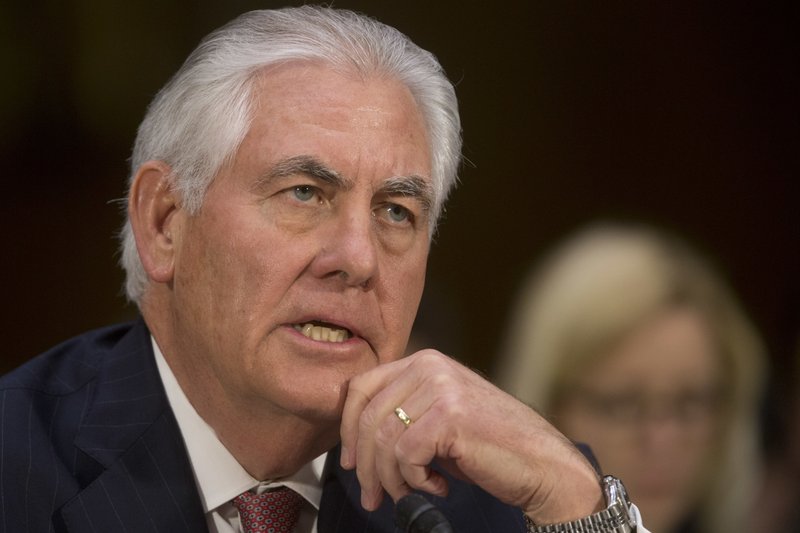
Seeking support from abroad, the U.S. struggled Monday to explain a hazy Syria strategy that has yet to clarify key questions: whether President Bashar Assad must go, how displaced Syrians will be protected and when America might feel compelled to take further action. Successive attempts by top Trump administration officials to articulate a plan have only furthered the appearance of a policy still evolving, even after the U.S. broke with precedent last week by attacking Assad’s forces. In the absence of answers, other countries seem to be moving ahead on their own terms. British Foreign Secretary Boris Johnson, after a meeting in Italy with U.S. Secretary of State Rex Tillerson, floated the possibility of new sanctions on both the Syrian and Russian militaries, an idea the U.S. has only briefly mentioned. In an unusual announcement for a foreign government, Johnson also said the U.S. could launch more cruise missiles into Syria like the ones President Donald Trump ordered last week in reaction to Assad’s use of chemical weapons. “Crucially, they could do so again,” Johnson said. Tillerson himself raised fresh expectations for aggressive U.S. action — and not only in Syria — as he visited Sant’Anna di Stazzema, a Tuscan village where the Nazis massacred more than 500 civilians during World War II. As he laid a wreath, he alluded to the Syria chemical attack. “We rededicate ourselves to holding to account any and all who commit crimes against the innocents anywhere in the world,” Tillerson said. Though such comments hint at a more activist U.S. foreign policy focused on preventing humanitarian atrocities, Trump has consistently suggested he prefers the opposite approach. His young administration has generally downplayed human rights concerns while promoting an “America First” strategy de-emphasizing the concerns of foreign nations. The uncertain view of U.S. objectives prevailed as Tillerson planned to attend a meeting Tuesday of the “likemindeds” — countries that share a similar approach to resolving Syria’s protracted civil war. The session on the sidelines of the Group of 7 summit in Italy was to include Middle East countries, including Turkey, Saudi Arabia, Jordan and the United Arab Emirates, that share a U.S. interest in resolving the conflict and resisting Iran’s influence in Syria. Tuesday night, Tillerson will fly to Moscow, the first official visit by a Trump Cabinet official to Russia, Assad’s strongest ally. The U.S. has said its Syria strategy centers on persuading President Vladimir Putin to stop supporting Assad. On Monday, the U.S. upped the stakes significantly by accusing Russia of knowing in advance of the chemical attack and using a Russian-operated drone to help cover it up. No component of Trump’s Syria policy has engendered more confusion than Assad’s future — an issue that similarly befuddled the Obama administration, whose once-adamant position that Assad must go softened substantially by the time President Barack Obama left office in January. Leading up to the U.S. missile attack, Trump’s administration had said Assad’s future was up to the Syrian people. Then Trump, the day after the assault, said his thinking about Assad had changed. Tillerson answered a question about effecting regime change by saying the U.S. was organizing a coalition to do just that. Yet after Trump’s retaliatory strike, the position became less clear. Some officials, like Tillerson, said the U.S. was confident Syrians would choose on their own to push Assad aside, while suggesting the U.S. wouldn’t mandate it. U.N. Ambassador Nikki Haley and others said ousting Assad was indeed a U.S. goal, but only one of several. Another unanswered question: Did Trump’s strike set a precedent that any chemical attack will trigger a U.S. response? At the White House, spokesman Sean Spicer insisted that Trump wouldn’t box himself in by disclosing his actions in advance. But he added further uncertainty to the equation by saying that even barrel bombs — which Assad has used with frequency — would necessitate U.S. action. “If you gas a baby, if you put a barrel bomb in to innocent people, I think you will see a response from this president,” Spicer said. Minutes later, the White House rushed to clarify that Spicer wasn’t announcing any new policy on barrel bombs. “Nothing has changed in our posture,” a White House official said in a written statement. On one point, the administration has been consistent: Defeating the Islamic State group in Syria is the first priority. There’s less certainty about what comes now. Tillerson and other officials have said the next priority is to create “zones of stability” in Syria where those displaced by civil war can live without fear of violence. They say that entails negotiating cease-fires between Assad’s government and rebels, who have been fighting both IS and Assad. With stability restored, they say, conditions will be ripe for a U.N.-brokered political transition. Yet it’s unclear why rebel groups would agree to cease-fires with Assad, who would protect the zones, and how. Assad’s willingness to clear the way for political talks predicated on him leaving power is deeply in question. Republished with permission of The Associated Press.
As Aleppo falls, Donald Trump faces test on posture toward Russia
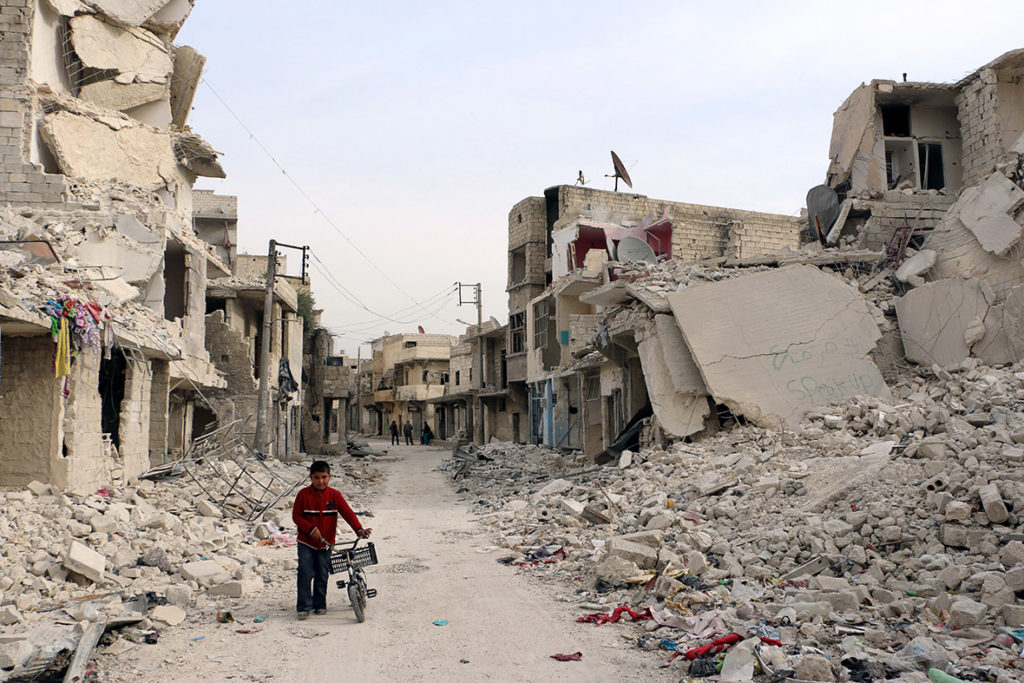
Aleppo’s fall to Syrian government forces is shaping up as the first major test of President-elect Donald Trump‘s desire to cooperate with Russia, whose military support has proven pivotal in Syria’s civil war. The death and destruction in the city is only renewing Democratic and Republican concern with Trump’s possible new path. Though Trump has been vague about his plans to address this next phase in the nearly six-year-old conflict, he’s suggested closer alignment between U.S. and Russian goals could be in order. His selection Tuesday of Exxon Mobil CEO Rex Tillerson, who has extensive business dealings with Russia and ties to President Vladimir Putin, fueled further speculation that Trump will pursue a rapprochement with Moscow. Indeed, Trump was already trying to portray Tillerson’s connections with Russia as a plus. In talking points circulated on Capitol Hill and obtained by The Associated Press, Trump’s transition team said Tillerson would “work closely” with Russia on “defeating radical Islam” but would “easily challenge Russia and other countries when necessary.” “President Putin knows Mr. Tillerson means what he says,” the talking points say. A warmer relationship could alter U.S. policy on nuclear weapons, sanctions, Ukraine and innumerable other issues – but none so clearly or quickly as Syria, where President Bashar Assad‘s defeat of U.S.-backed rebels in Aleppo is poised to be a turning point. Assad and Russia are expected seize the moment to try to persuade the U.S. to abandon its flailing strategy of trying to prop up the rebels in their battle to oust Assad. That decision will fall to Trump. The president-elect has not commented or tweeted about the crisis in Aleppo and widespread fears of humanitarian disaster. Yet his previous comments on the broader conflict suggest he’s more than open to a policy shift. During the campaign, Trump asserted that defeating the Islamic State group in Syria, not Assad, must be the top priority, a position that mirrors Russia’s. “I believe we have to get ISIS. We have to worry about ISIS before we can get too much more involved,” Trump said in October, using an acronym for the extremist group. Prioritizing the fight against IS could put the U.S. in closer alignment with Russia’s public position, in a Middle Eastern take on the adage that “the enemy of my enemy is my friend.” It’s a point Trump appeared to make during the second presidential debate when he noted that he didn’t like Assad, but added, “Assad is killing ISIS. Russia is killing ISIS.” And in his first days as the president-elect Trump suggested he might withdraw U.S. support for the various rebel groups that make up Assad’s opposition, telling a newspaper that “we have no idea who these people are.” Trump’s posture doesn’t just buck President Barack Obama‘s policy, it conflicts with his party’s stance, as well. Trump’s running mate, Vice President-elect Mike Pence, argued during the campaign that the U.S. should strike Assad’s forces if needed to prevent devastation in Aleppo. Trump took the remarkable step of contradicting him. “I disagree,” Trump said, and Pence quickly backed off the threat of military action. Both Democratic and Republican critics say Trump’s brushstroke analysis of Syria’s internal conflicts paints a far rosier picture of Russia’s aims than reality – and even endorses some of the propaganda Assad has used to delegitimize his opponents. “Putin is a thug, a bully and a murderer, and anybody else who describes him as anything else is lying,” Sen. John McCain, R-Ariz., said after word emerged that Trump was picking Tillerson as his chief diplomat. While Moscow has attacked IS at times, the U.S. and its allies say most Russian airstrikes have targeted rebel-dominated areas where IS isn’t active. American officials accuse Assad of a soft approach toward IS, and even of colluding with the group in hopes of marginalizing U.S.-backed rebels. Though the U.S. under Obama has tried to work diplomatically with Russia, Syria cease-fire deals have repeatedly collapsed, with the U.S. accusing Moscow of failing to use its influence to prevent Assad from violating them. Meanwhile, Russia’s military intervention has been successful in helping Assad reclaim the upper hand, making Putin a key player in Syria’s future. So closely aligned are Russia and Syria that it was Russia that negotiated a cease-fire to evacuate the last civilians and opposition fighters from eastern Aleppo, rebels said. The rebels had been squeezed for months into smaller and smaller areas of Aleppo. The city’s status as Syria’s commercial hub makes its capture a key victory for Assad. As world leaders debate what to do next, all eyes are on Trump, who takes office on Jan. 20. Robert Ford, the former U.S. ambassador to Syria and a Middle East Institute scholar, said the horrifying images of suffering emanating from Syria would force Trump to outline a more detailed response. “While the Trump administration may want to avoid getting into the business of regime change, it’s still going to have to address what it does about grotesque violations of international humanitarian law and war crimes,” said Ford. “Just saying ‘we’re not interested in regime change’ is not a response.” Aligning with Russia would make it harder for the U.S. to corral the rebels’ more strident supporters into supporting peace mediation. Assad foes like Turkey, Qatar and Saudi Arabia might become more inclined to give extremists advanced weaponry despite U.S. protestations. Concerns that Trump may soften U.S. policy toward Russia, currently under tough U.S. sanctions over its actions in Ukraine, burgeoned during the campaign amid signs of Russian hacking of political groups. U.S. intelligence agencies now say the hacking was intended to help Trump win. Those concerns grew louder still Tuesday when Trump tapped Tillerson for secretary of state despite his history of arguing against sanctions on Russia, which could affect Exxon’s joint ventures with Russia’s state oil company. In 2013, Putin awarded Tillerson the Order of Friendship in honor of his efforts to improve U.S.-Russia ties. Republished with permission of The Associated Press.
Jerusalem mayor hopes Donald Trump will move US Embassy to the city

Jerusalem’s mayor said Tuesday that he is confident Donald Trump will move the American Embassy from Tel Aviv to Jerusalem, a break in U.S. policy that is sure to anger Palestinians, who claim the eastern sector of the city for their future capital. Mayor Nir Barkat told The Associated Press that he has been in touch with Trump’s staff about the issue. While previous presidential candidates have made similar promises, Barkat said his conversations have led him to believe that Trump is serious about making the move. “Naturally my intuition tells me that it’s different this time, knowing the people hearing his statements, where we are today,” Barkat said. Transferring the embassy to Jerusalem would be a highly symbolic and politically charged act. The fate of the east Jerusalem is at the heart of the conflict between Israel and the Palestinians. Virtually all embassies to Israel are located in or around Tel Aviv. Israel captured east Jerusalem in the 1967 Mideast war and annexed it in a move that is not internationally recognized. It claims the entire city as its capital. The Palestinians seek east Jerusalem, home to key Jewish, Muslim and Christian holy sites, as the capital of their future state. “The United States of America has embassies in all of the world’s capitals with the exception of Israel,” Barkat said. “That’s absurd, and moving the embassy to the capital of the Jewish people, to Jerusalem, is a straightforward, standard thing to do.” Barkat spoke a day after Trump’s spokeswoman Kellyanne Conway told conservative radio host Hugh Hewitt that the president-elect is determined to move the embassy to Jerusalem when he takes office “That is a very big priority for this president-elect, Donald Trump,” she said. “He made that very clear during the campaign, Hugh. And as president-elect, I’ve heard him repeat it several times privately, if not publicly.” The moving of the embassy, and recognition of Jerusalem as Israel’s capital, enjoys broad support among Israel’s Jewish majority. Speaking to foreign reporters Monday, before Conway’s comments had been reported, opposition lawmaker Yair Lapid called the proposal an “excellent idea.” Moving the embassy to Jerusalem would signal U.S. recognition of Jerusalem as Israel’s capital, a move that would infuriate Palestinians, break decades of American policy and distance the U.S. from most of the international community, including its closest allies in Western Europe. The Palestinians condemned the idea. “Any attempt to move the embassy to Jerusalem will not help achieve peace,” said Adnan Husseini, Palestinian minister for Jerusalem affairs. He urged Trump to instead push for the establishment of a Palestinian state as part of a peace settlement with Israel. Trump has said he would like to broker a peace deal, but he has given few details on how he hopes to do so. He has raised concerns among Palestinians because many of his advisers take hard-line positions that favor Israel, and his campaign platform made no mention of Palestinian independence – a U.S. position for the past two decades. The last round of U.S.-mediated peace talks collapsed over two years ago. Republished with permission of the Associated Press.
John Kerry: US, Russia studying new ideas to stop Syria fighting
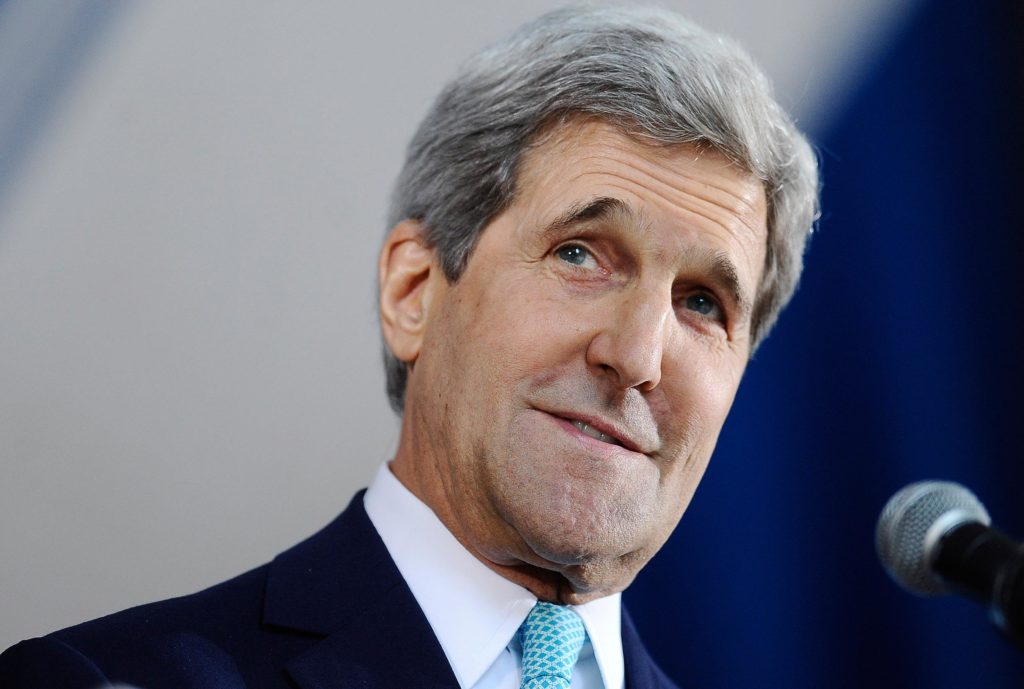
The United States and Russia are studying new ways to break a months-long diplomatic deadlock over how to stop the fighting in the Syrian city of Aleppo, U.S. Secretary of State John Kerry said Friday. He said the “ideas” will be tested in follow-up discussions between American and Russian diplomats next week. While Kerry didn’t elaborate on the substance of the fresh approaches being worked on with Russia, he stressed that the U.S. and Russia both see the situation as urgent and aren’t waiting for Donald Trump‘s presidency to begin on Jan. 20. But given the repeated failures of the former Cold War foes to halt Syria’s 5 ½-year civil war, it is unclear how much hope the new effort holds. “We have exchanged a set of ideas, which there will be a meeting on early next week in Geneva, and we have to wait and see whether those ideas have any legs to them,” Kerry said after meeting Russian Foreign Minister Sergey Lavrov in Rome. “I will say that both sides understand the importance of trying to continue the diplomacy and trying to see if something can be done. Nobody is waiting for the next administration. We both feel there is urgency.” Kerry said he will gauge progress with Lavrov when they meet again on the sidelines of a European security conference in Hamburg, Germany, on Wednesday. While the talks were going on, Syria showed off its recent gains in Aleppo, once the country’s largest city and commercial center. State media reported Friday from areas captured this week in a Russian-backed ground offensive, airing reports of roads being restored, debris removed and civilians resettled. The U.N. aid agency said an estimated 31,500 people have been displaced as a result of the recent fighting, which takes Syrian President Bashar Assad’s government closer to capturing the whole city and completing what would be perhaps a devastating blow to U.S.-backed rebel forces. The war has killed as many as half a million people since 2011, contributed to Europe’s worst refugee crisis since World War II and allowed the Islamic State group to emerge as a global terror threat. Friday’s diplomatic discussions took place in a hotel several stories above an Italian-hosted conference on the Mediterranean region, and Russia’s Lavrov emphasized that his country won’t allow Syria to follow the example of lawless Libya after NATO’s 2011 intervention that helped topple dictator Moammar Gadhafi. That country now is experiencing perhaps its worst violence in two years as rival militias and extremist groups such as IS continue to vie for power. While Washington has accused Moscow of war crimes and crimes against humanity in Syria, Lavrov blamed both the U.S. and United Nations for the current situation. He lamented that the U.S. has been unable to fulfill its commitment under several past cease-fire plans to separate the so-called “moderate” opposition groups from the al-Qaida-linked fighters that Russia says it is targeting. And he questioned why the U.N. isn’t restarting peace talks or rushing aid to areas of Syria in need, something the global body has been extremely reticent to do since a September convoy was hit by an airstrike. The U.S. has blamed Russia for that attack, a charge Moscow denies. “The time is ripe for compromise,” Lavrov said. Both diplomats met Friday with the U.N.’s envoy for Syria, Staffan de Mistura. As journalists were ushered into his meeting with Kerry, reporters could hear the peace mediator telling the U.S. secretary of state, “Anything but stalemate.” Republished with permission of The Associated Press.
House Republicans to Barack Obama: Take no more action on Iran
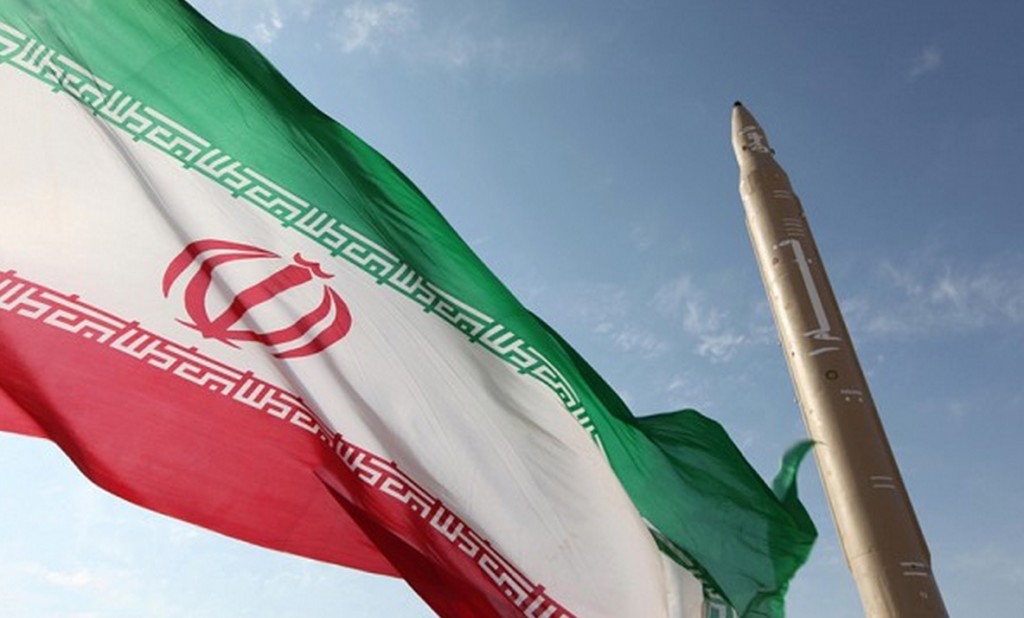
House Republican leaders are urging President Barack Obama to take no more action on Iran that could reinforce the nuclear deal before he leaves office. House Speaker Paul Ryan, Majority Leader Kevin McCarthy and Foreign Affairs Committee Chairman Ed Royce are issuing the request in a letter to Obama dated Tuesday. The Republicans say they expect to pass a bill soon extending Iran sanctions. They say signing it should be Obama’s only further step on Iran. The leaders say Obama shouldn’t waive sanctions, grant new commerce licenses or issue new guidance to companies about doing business legally in Iran. The leaders say President-elect Donald Trump deserves the chance to assess U.S. policy toward Iran without Obama making it more complicated. The White House had no immediate response to the letter. Republished with permission of the Associated Press.
Jeff Sessions, Mike Pompeo, Mike Flynn picked by Donald Trump for top jobs

President-elect Donald Trump is announcing his choices for three key administration jobs Friday, naming Alabama Sen. Jeff Sessions for attorney general, Kansas Rep. Mike Pompeo to head the CIA and former military intelligence chief Michael Flynn as his national security adviser. All three have been fierce critics of President Barack Obama and current U.S. policy. In tapping Sessions and Flynn, Trump is also rewarding a pair of loyalists who were among his most ardent supporters during the presidential campaign. Trump planned to announce the picks Friday, according to a senior transition official. The official insisted on anonymity in order to disclose the decisions ahead of Trump’s announcement. Sessions and Pompeo would both require Senate confirmation before assuming their designated roles; Flynn would not. There could be some hurdles for Sessions, even with Republicans in control of the chamber. When Sessions was nominated to be a federal judge in 1986, he was dogged by racist comments he was accused of making while serving as U.S. attorney in Alabama. “Mr. Sessions is a throwback to a shameful era, which I know both black and white Americans thought was in our past,” the late Massachusetts Democrat, Sen. Edward Kennedy, said during the 1986 confirmation hearing. “It is inconceivable to me that a person of this attitude is qualified to be a U.S. attorney, let alone a U.S. federal judge.” During the hearing, a former assistant U.S. attorney, Thomas Figures, who is black, said Sessions referred to him as “boy,” and told him to be careful what he said to “white folks.” Sessions said he never called Figures “boy,” but Kennedy produced a letter from an organization of black lawyers that said Figures made the allegation about Sessions to the organization’s investigators at least twice. Sessions told the committee that he told Figures to be careful what he said to “folks.” Sessions later withdrew from consideration, though he went on to become state attorney general and won election to the Senate in 1996. Pompeo is a conservative Republican and a fierce critic of President Barack Obama‘s nuclear deal with Iran. Flynn was a fierce critic of President Barack Obama’s military and foreign policy long before he began advising Trump on national security issues during the presidential campaign. While the position of national security adviser doesn’t require Senate confirmation, Flynn would work in the West Wing and have frequent access to the president. Flynn, who turns 58 next month, had built a reputation as an astute intelligence professional and straight talker when he became the director of the Defense Intelligence Agency in 2012. After retiring two years later, he made clear he took issue with the Obama administration’s approach to global affairs and fighting Islamic State militants. Flynn has called for Washington to work more closely with Moscow, echoing similar statements from Trump. But his warmth toward Russia has worried some national security experts. Flynn traveled last year to Moscow, where he joined Russian President Vladimir Putin and other officials in a celebration of RT, a television channel funded by the Russian government. He later explained that he had been paid for taking part in the event, but brushed aside concerns that he was aiding a Russian propaganda effort. Trump is a foreign policy novice and his early moves on national security are being closely watched both in the U.S. and overseas. He’s said to be considering a range of officials with varying degrees of experience to lead the State Department and Pentagon. Trump has also consulted with former Secretary of State Henry Kissinger and sat down with South Carolina Gov. Nikki Haley, a potential contender to lead the State Department. In a separate gesture of reconciliation with establishment Republicans, Trump planned to meet with 2012 Republican presidential nominee Mitt Romney, who lambasted Trump as a “con man” and a “fraud” in a stinging speech in March. Trump responded by repeatedly referring to Romney as a “loser.” The two began mending fences after Trump’s victory when Romney called with congratulations. They are to meet this weekend, a transition official said, speaking on condition of anonymity because he wasn’t authorized to discuss Trump’s schedule publicly. Campaign manager Kellyanne Conway said they were still “working on” the meeting. Trump’s actions Thursday aimed to show that he could soften his rhetoric, offer pragmatism in the White House and reaffirm long-standing American alliances. Since his stunning victory over Hillary Clinton last week, Trump has spoken with Russian President Vladimir Putin, British Prime Minister Theresa May and nearly three dozen other world leaders by telephone. Ron Dermer, Israel’s ambassador to the United States, also visited the Trump Tower and called the billionaire businessman “a true friend of Israel.” He specifically cited as another “friend” Trump campaign CEO Steve Bannon, whose selection as a top White House adviser has created a backlash among Democrats. Bannon’s news website has peddled conspiracy theories, white nationalism and anti-Semitism. “We look forward to working with the Trump administration, with all the members of the Trump administration, including Steve Bannon, in making the U.S.-Israel alliance stronger than ever,” Dermer said. Trump, a reality television star, business mogul and political newcomer, also rolled out new teams that will interact with the State Department, Pentagon, Justice Department and other national security agencies as part of the government transition before his Jan. 20 inauguration. Republished with permission of The Associated Press.


